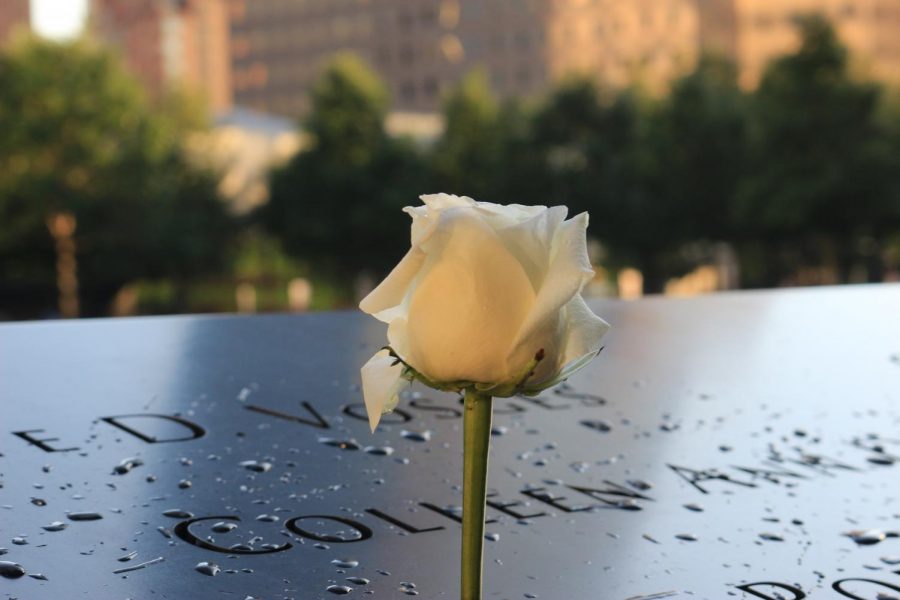Shake UNI
Across the nation people grieved the loss of lives as a result of the attacks.
Sep 13, 2021
Editor’s Note: This story was originally published in the Northern Iowan on Sept. 14, 2001
As news of the Tuesday morning terrorist attacks on the World Trade Center and the Pentagon circulated, a wave of shock, disbelief and mourning swept the world.
UNI was like so many other communities, saddened and angered by the event.
Students reported to classes as they do everyday, but it was unlike anything anyone had experienced or could remember.
Perhaps one of UNI’s closest link was Phil Mauceri, associate professor of political science who teaches a terrorism class on campus. Mauceri, a native of the New York area, had returned home on a visit.
“I was in midtown when it happened,” Mauceri said via a telephone interview Tuesday afternoon. “I was traveling from New Jersey to Manhattan when I saw a huge plume of smoke.
“People in New York often pull their cars over on the streets and blare their car radios,” he described. “That’s how I found out what had happened.”
Mauceri described that he got on a subway in an attempt to get away from the area, but couldn’t go far because public transportation was shut down almost immediately. Like scores of other people, he found himself walking north.
“It was like war,” Mauceri said. “The air was filled with ash and smoke. People looked like refugees, and the scene was like one out of Bosnia. No one was being allowed south of 42nd street. The police had automatic weapons. It was not like anything I’ve ever seen.”
Mauceri reported that amazingly the crowds were calm as they evacuated from the area.
“There was an eerie silence because there weren’t any cars on the streets of New York City,” Mauceri said. “We could hear military aircraft overhead, but otherwise there weren’t any airplanes. People were dejected, but no one panicked. People knew what they needed to do.”
As people across the nation scrambled to learn what had happened, those familiar with the study of terrorism and international relations were struggling to explain the thoughts and motives of the terrorists.
“Terrorists want to show how vulnerable their victim is,” Steven Lobell, associate professor of political science, said. “The World Trade Center and the Pentagon are obvious images.”
Mauceri expanded the purpose of the targets, saying, “Clearly [the terrorists] hit two important symbols. New York City is the financial capital of the nation and Washington, D.C. is the political capital. They are symbols of power in the United States.”
Dhirendra Vajpeyi, professor of political science and a Middle East expert, focused on the speculation that a group was behind the attack.
“Despite the fact that an organization may have taken credit for the attack, there’s no valid link between one. particular Middle Eastern group and this act,” he said. “We can’t rule out that this could have been a coordinated event. There are groups in this world who are disgruntled and there are groups who don’t like the United States’ foreign policies. This is a war of attrition.
“This is so sad. American soil has not seen this since Pearl Harbor,” Vajpeyi said.
Likening the attacks to that on Pearl Harbor in 1941 has become commonplace in the reports on television, in the newspaper and between friends and families. Pointedly, however, there are some significant differences.
“Making an analogy between this event and Pearl Harbor is a good comparison in some ways, but not all,”
Lobell said. “It’s the same caliber as Pearl Harbor, but with Pearl Harbor we had knowledge of who perpetrated the attack and we had someone to retaliate against.”
As area malls closed and cancellations flashed television screens, UNI students attended classes and meetings as scheduled,
“We made the decision to continue with classes and business as usual because people needed to cope,” UNI President Robert Koob said. “It’s an opportunity for students to share thoughts and feelings with each other and faculty. We visited with some students
and decided continuing with business was the best plan.” Addressing the safety of the UNI community, Koob said: “We have asked Public Safety to watch for inappropriate actions against other people. This is an opportunity for moral leadership.”
Leadership and support came from every level Tuesday, including a statement released by low Governor Tom Vilsack and Lieutenant Governor Sally Pederson: In their statement the two Iowa leaders expressed the sentiments that so many Americans felt after the disaster and detailed the ways in which i Iowans are helping with the cause.
“As the lead state coordinating agency in the nation, Iowa’s Emergency Management Division has been working with other state emergency management divisions to respond to today’s terrorist attacks,” the statement said. “The Iowa Emergency. Operations Center also is activated and is standing by to respond to any need in Iowa as well as to help other states affected by today’s attacks.”
The statement continued, “As always, Iowa’s National Guard stands ready to provide support and assistance to people in need. We are extremely proud of these men and women and appreciate their service.”
In addition, the statement thanked those Iowans who have already donated blood and encouraged others to do the same and contact their local blood banks. Also, Vilsack and Pederson urged those planning to travel by air in the next couple of days to travel so that those who have been stranded can get to their destinations and emergency personnel can get to the areas where they are needed.
In the aftermath of this attack on the nation, many people are wondering what will come next. President Koob admits “we can’t anticipate the long-term effects,” while Professor Vajpeyi paints a much grimmer picture.
“This is not the first time this has happened, and unfortunately it may not be the last time. We don’t know where the next hit will be coming from.













